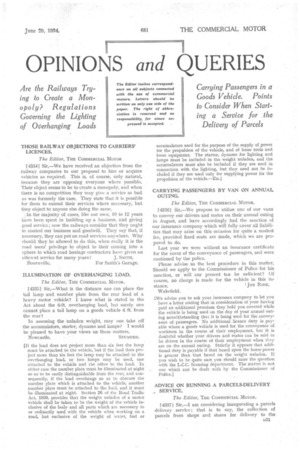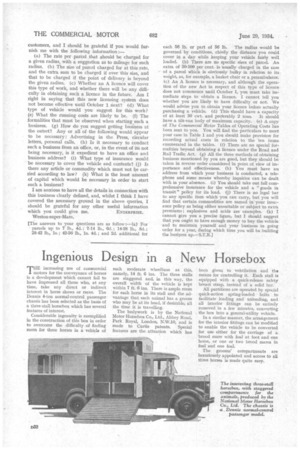OPINIONS and QUERIES
Page 105

Page 106

If you've noticed an error in this article please click here to report it so we can fix it.
Are the Railways Trying to Create a Monopoly? Regulations Governing the Lighting of Overhanging Loads
THOSE RAILWAY OBJECTIONS TO CARRIERS' LICENCES.
The Editor, THE COMMERCIAL MOTOR
(43343 Sir,—We have received an objection from the railway companies to our proposal to hire or acquire vehicles as required. This is. of course, only natural, because they are ' opposing everyone where possible. Their object seems to be to create a monopoly, and when there is no competition they may give a service as bad as was formerly the case. They state that it is possible for them to extend their services where necessary, but they object to anyone else doing the same.
In the majority of cases, like our own, 10 to 12 years have been spent in building up a business, and giving good service ; now the railways consider that they ought to control our business and goodwill. They say that, if necessary, they can put on road services anywhere. Why should they be allowed to do this, when really it is the road users' privilege to object to their coming into a sphere to which road haulage contractors have given an
efficient service for many years? J. SMITH,
Bournville. For Smith's Garage.
ILLUMINATION OF OVERHANGING LOAD.
The Editor, THE COMMERCIAL MOTOR.
[4335] Sir,—What is the distance one can place the tail lamp and number plate from the rear load of a heavy motor vehicle? I know what is stated in the Act about the 6-ft. overhanging load, but surely one cannot place a tail lamp on a goods vehicle 6 ft. from the rear?
In assessing the unladen weight, may one take off the accumulators, starter, dynamo and lamps? I would be pleased to have your views on these matters.
Newcastle. STUMPED.
[If the load does not project more than six feet the lamp must be attached to the vehicle, but if the load does project more than six feet the lamp may be attached to the overhanging load, or two lamps may be used, one attached to the vehicle and the other to the load. In either case the number plate must be illuminated at night so as to be easily distinguishable from the rear, and consequently, if the load overhangs so as to obscure the number plate which is attached to the vehicle, another number plate must be attached to the load, and it must be illuminated at night. Section 26 of the Road Traffic Act, 1930, provides that the weight unladen of a motor vehicle shall be taken to be the weight of the vehicle inclusive of the body and all parts which are necessary to or ordinarily used with the vehicle when working on a road, but exclusive of the weight of water, fuel or
accumulators used for the purpose of the supply of powex for the propulsion of the vehicle, and of loose tools and loose equipment. The starter, dynamo for lighting and lamps must be included in the weight unladen, and the accumulators must also be included if they are used in connection with the lighting, but they need not be included if they are used only for supplying power for the propulsion of the vehicle.—ED.] CARRYING PASSENGERS BY VAN ON ANNUAL OUTING.
The Editor, THE COMMERCIAL MOTOR.
r4336] Sir,—We propose to utilize one of our vans to convey our drivers and mates on their annual outing in August, and have accordingly had the sanction of our insurance company which will fully cover all liabilities that may arise on this occasion for quite a modest fee, provided fixed seats are made, which we are prepared to do.
Last year we were without an insurance certificate for the cover of the conveyance of passengers, and were cautioned by the police.
Please advise us the best procedure in this matter. Should we apply to the Commissioner of Police for his sanction, or will our present tax be sufficient? Of course, no charge is made for the vehicle in this in
stance. JOY RIDE. Wakefield.
l'We advise you to ask your insurance company to let you have a letter stating that in consideration of your having paid an additional premium they hold you covered while the vehicle is being used on the day of your annual outing notwithstanding that it is being used for the conveyance of passengers. • No additional licence duty is payable where a goods vehicle is used for the conveyance of workmen in the course of their employment, but it is doubtful whether your drivers and mates can be said to be driven in the course of their employment when they are on the annual outing. Strictly it appears that additional duty is payable if that based upon the horse-power is greater than that based on the weight unladen. If you wish to be quite sure you should raise the question with the L.C.C. licensing department. The matter is not one which can be dealt with by the Commissioner of Police.]
ADVICE ON RUNNING A PARCELS-DELIVERY SERVICE.
The Editor, THE COMMERCIAL MOTOR.
143371 Sir,—I am considering inaugurating a parcels delivery service; that is to say, the collection of parcels from shops and stores for delivery to the D51 customers, and I should be grateful if you would furnish me with the following information :—
(a) The rate per parcel that should be charged for a given radius, with a suggestion as to mileage for such radius. (b) The size of parcel charged for at this rate, and the extra sum to be charged if over this size, and that to be charged if the point of delivery is beyond the given radius. (c) Whether an A licence will cover this type of work, and whether there will be any difficulty in obtaining such a licence in the future. Am I right in saying that this new licensing system does not become effective until October 1 next? (d) What type of vehicle would you suggest for this work? (e) What the running costs are likely to be. (f) The formalities that must be observed when starting, such a business. (g) How do you suggest getting business at the outset? Any or all of the following would appear to be necessary : Advertising in the Press, circular letters, personal calls. (h) Is it necessary to conduct such a business from an office, or, in the event of its not being necessary, is it expedient to have an office and business address? (i) What type of insurance would be necessary to cover the vehicle and contents? (j) Is there any article or commodity which must not be carried according to law? (k) What is the least amount of capital which would be necessary in order to start such a business?
I am anxious to have all the details in connection with this business clearly defined, and, whilst I think I have covered the necessary ground in the above queries. I should be grateful for any other useful information which you could give me. ENTERPRISE. Weston-super-Mare.
[The answers to your questions are as follow :—(a) For • parcels up to 7 lb., 4d. ; 7-14 lb., 6d.; 14-28 lb., 8d.; 28-42 lb., 1s.; 42-56 lb., 1.s. 4d. ; and 2d. additional for each 56 lb. or part of 541 lb. The radius would be
governed by conditions, chiefly the distance you could cover in a day while keeping your vehicle fairly well loaded. (b) There are no specific sizes of parcel. An extra of 50-100 per cent. is usually charged in the case of a parcel which is obviously bulky in relation to its weight, as, for example, a basket chair or a perambulator. (c) An A licence is necessary, and although the operation of the new Act in respect of this type of licence does not commence until October 1, you must take immediate steps to obtain a licence. I cannot tell you whether you are likely to have difficulty or not. We would advise you to obtain your licence before actually purchasing a vehicle. (d) This should have a capacity of at least 30 cwt. and preferably 2 tons. It should have a tilt-van body of maximum capacity. (e) A copy of The Commercial Motor Tables of Operating Costs has been sent to you. You will find the particulars to meet your case in Table 1 and you should make provision for recording actual costs in relation to the ten items enumerated in the tables. (f) There are no special formalities beyond obtaining a licence under the Road and Rail Traffic Act. (g) All the three methods of obtaining business mentioned by you are good, but they should be -taken in reverse order considered in point of view of importance and effectiveness. (h) You must have an address from which your business is conducted, a telephone and some means whereby inquiries can be dealt with in your absence. (i) You should take out full comprehensive insurance for the vehicle and a "goods in transit" policy for its load. (j) There is no legal bar to any specific item which you can carry, but you will find that certain commodities are named in your insurance policy as being either unsuitable or subject to extra premiums ; explosives and acids are examples. (k) I cannot give you a precise figure, but I should suggest that you ought to have enough money to buy the vehicle and to maintain yourself and your business in going order for a year, during which time you will be building the business up.—S.T.R.]
































































































































































